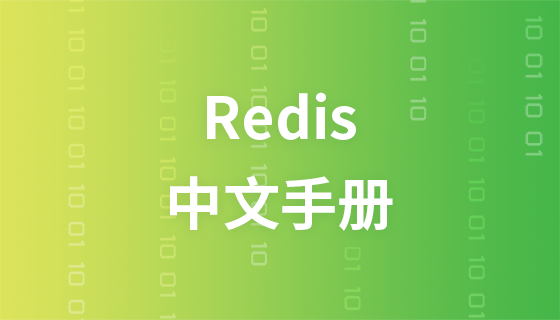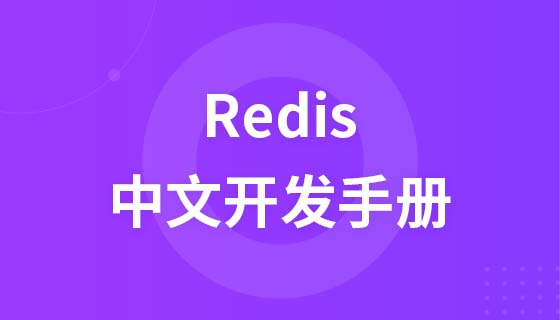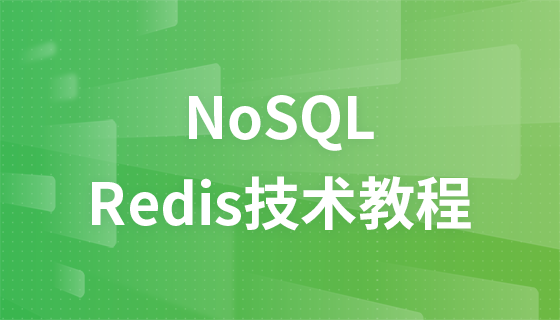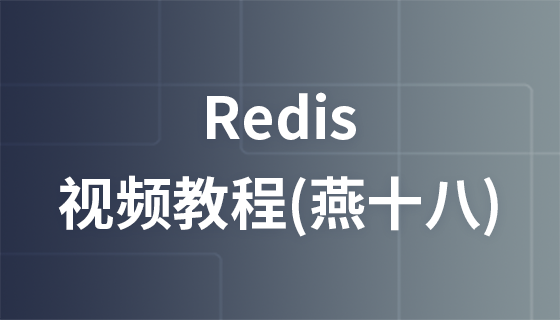
推薦(免費):redis教學
今天,日月在這裡教大家如何使用springBoot整合redis,說實話比較簡單,網路上也有大把的教學。先套用一下網路上的簡介。
定義
REmote DIctionary Server(Redis) 是由Salvatore Sanfilippo所寫的key-value儲存系統。
Redis是一個開源的使用ANSI C語言編寫、遵守BSD協定、支援網路、可基於記憶體亦可持久化的日誌型、Key-Value資料庫,並提供多種語言的API。
它通常被稱為資料結構伺服器,因為值(value)可以是字串(String), 雜湊(Map), 列表(list), 集合(sets) 和有序集合(sorted sets)等類型。
reids的優點
以下是Redis的一些優點。
異常快速 - Redis非常快,每秒可執行大約110000次的設定(SET)操作,每秒大約可執行81000次的讀取/獲取(GET)操作。
支援豐富的資料類型 - Redis支援開發人員常用的大多數資料類型,例如列表,集合,排序集和散列等等。這使得Redis很容易被用來解決各種問題,因為我們知道哪些問題可以更好使用地哪些資料類型來處理解決。
操作具有原子性 - 所有Redis操作都是原子操作,這確保如果兩個客戶端並發訪問,Redis伺服器能接收更新的值。
多實用工具- Redis是一個多實用工具,可用於多種用例,如:緩存,訊息隊列(Redis本地支援發布/訂閱),應用程式中的任何短期數據,例如,web應用程式中的會話,網頁命中計數等。
Redis 安裝
Window 下安裝
下載位址:https://github.com/MSOpenTech/redis/releases。
Redis 支援 32 位元和 64 位元。這個需要根據你係統平台的實際情況選擇,這裡我們下載 Redis-x64-xxx.zip壓縮包到 C 盤,解壓縮後,將資料夾重新命名為 redis。
開啟一個cmd 視窗使用cd指令切換目錄到C:\redis
執行redis-server.exe redis.windows.conf
如果想方便的話,可以把redis 的路徑加到系統的環境變數裡,這樣就省得再輸路徑了,後面的那個redis.windows.conf 可以省略,如果省略,會啟用預設的。輸入之後,會顯示如下介面: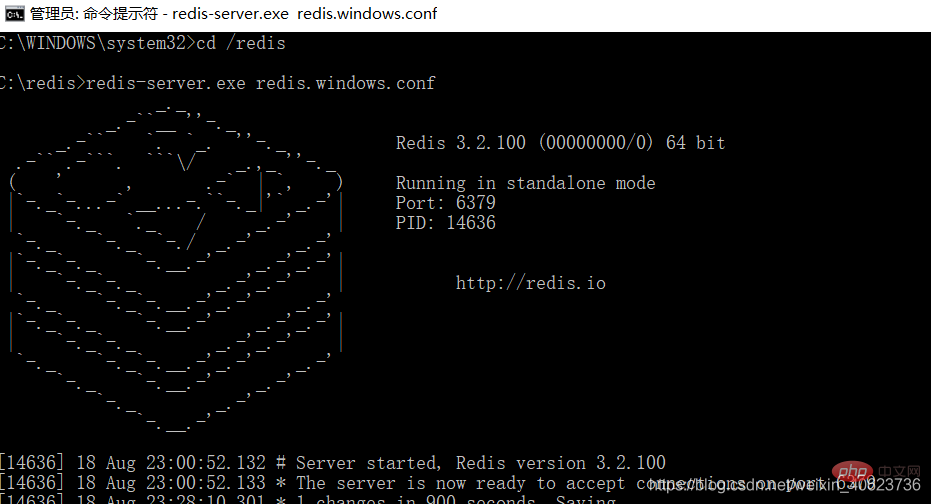
整合redis
#我們還是延用上一章的專案:Springboot整合springcloud-config實現dataSource熱部署
1、新增依賴
<!--集成redis--> <dependency> <groupid>org.springframework.boot</groupid> <artifactid>spring-boot-starter-redis</artifactid> <version>1.4.1.RELEASE</version> </dependency> <dependency> <groupid>com.alibaba</groupid> <artifactid>fastjson</artifactid> <version>1.2.3</version> </dependency> <dependency> <groupid>com.fasterxml.jackson.core</groupid> <artifactid>jackson-databind</artifactid> </dependency>
2、在設定中心裡新增redis配置
spring.redis.host=127.0.0.1 #Redis服务器连接端口 spring.redis.port=6379 #Redis服务器连接密码(默认为空) spring.redis.password= #连接池最大连接数(使用负值表示没有限制) spring.redis.pool.max-active=8 #连接池最大阻塞等待时间(使用负值表示没有限制) spring.redis.pool.max-wait=-1 #连接池中的最大空闲连接 spring.redis.pool.max-idle=8 #连接池中的最小空闲连接 spring.redis.pool.min-idle=0 #连接超时时间(毫秒) spring.redis.timeout=30000
#3、設定類別RedisConfig
import java.lang.reflect.Method;
import org.springframework.beans.factory.annotation.Value;
import org.springframework.cache.CacheManager;
import org.springframework.cache.annotation.CachingConfigurerSupport;
import org.springframework.cache.annotation.EnableCaching;
import org.springframework.cache.interceptor.KeyGenerator;
import org.springframework.cloud.context.config.annotation.RefreshScope;
import org.springframework.context.annotation.Bean;
import org.springframework.context.annotation.Configuration;
import org.springframework.data.redis.cache.RedisCacheManager;
import org.springframework.data.redis.connection.RedisConnectionFactory;
import org.springframework.data.redis.connection.jedis.JedisConnectionFactory;
import org.springframework.data.redis.core.RedisTemplate;
import org.springframework.data.redis.core.StringRedisTemplate;
import org.springframework.data.redis.serializer.Jackson2JsonRedisSerializer;
import com.fasterxml.jackson.annotation.PropertyAccessor;
import com.fasterxml.jackson.annotation.JsonAutoDetect;
import com.fasterxml.jackson.databind.ObjectMapper;
@Configuration
@EnableCaching
@RefreshScope
public class RedisConfig extends CachingConfigurerSupport{
@Value("${spring.redis.host}")
private String host;
@Value("${spring.redis.port}")
private int port;
@Value("${spring.redis.timeout}")
private int timeout;
@Value("${spring.redis.password}")
private String password;
@Value("${spring.redis.pool.max-active}")
private int maxActive;
@Value("${spring.redis.pool.max-wait}")
private int maxWait;
@Value("${spring.redis.pool.max-idle}")
private int maxIdle;
@Value("${spring.redis.pool.min-idle}")
private int minIdle;
@RefreshScope
@Bean
public KeyGenerator wiselyKeyGenerator(){
return new KeyGenerator() {
@Override
public Object generate(Object target, Method method, Object... params) {
StringBuilder sb = new StringBuilder();
sb.append(target.getClass().getName());
sb.append(method.getName());
for (Object obj : params) {
sb.append(obj.toString());
}
return sb.toString();
}
};
}
@RefreshScope
@Bean
public JedisConnectionFactory redisConnectionFactory() {
JedisConnectionFactory factory = new JedisConnectionFactory();
factory.setHostName(host);
factory.setPort(port);
factory.setTimeout(timeout); //设置连接超时时间
factory.setPassword(password);
factory.getPoolConfig().setMaxIdle(maxIdle);
factory.getPoolConfig().setMinIdle(minIdle);
factory.getPoolConfig().setMaxTotal(maxActive);
factory.getPoolConfig().setMaxWaitMillis(maxWait);
return factory;
}
@RefreshScope
@Bean
public CacheManager cacheManager(RedisTemplate redisTemplate) {
RedisCacheManager cacheManager = new RedisCacheManager(redisTemplate);
// Number of seconds before expiration. Defaults to unlimited (0)
cacheManager.setDefaultExpiration(10); //设置key-value超时时间
return cacheManager;
}
@RefreshScope
@Bean
public RedisTemplate<string> redisTemplate(RedisConnectionFactory factory) {
StringRedisTemplate template = new StringRedisTemplate(factory);
setSerializer(template); //设置序列化工具,这样ReportBean不需要实现Serializable接口
template.afterPropertiesSet();
return template;
}
@RefreshScope
private void setSerializer(StringRedisTemplate template) {
Jackson2JsonRedisSerializer jackson2JsonRedisSerializer = new Jackson2JsonRedisSerializer(Object.class);
ObjectMapper om = new ObjectMapper();
om.setVisibility(PropertyAccessor.ALL, JsonAutoDetect.Visibility.ANY);
om.enableDefaultTyping(ObjectMapper.DefaultTyping.NON_FINAL);
jackson2JsonRedisSerializer.setObjectMapper(om);
template.setValueSerializer(jackson2JsonRedisSerializer);
}
}</string>4、RedisUtils類別
import java.io.Serializable;
import java.util.List;
import java.util.Set;
import java.util.concurrent.TimeUnit;
import org.springframework.beans.factory.annotation.Autowired;
import org.springframework.data.redis.core.HashOperations;
import org.springframework.data.redis.core.ListOperations;
import org.springframework.data.redis.core.RedisTemplate;
import org.springframework.data.redis.core.SetOperations;
import org.springframework.data.redis.core.ValueOperations;
import org.springframework.data.redis.core.ZSetOperations;
import org.springframework.stereotype.Service;
@Service
public class RedisUtils {
@Autowired
private RedisTemplate redisTemplate;
/**
* 写入缓存
* @param key
* @param value
* @return
*/
public boolean set(final String key, Object value) {
boolean result = false;
try {
ValueOperations<serializable> operations = redisTemplate.opsForValue();
operations.set(key, value);
result = true;
} catch (Exception e) {
e.printStackTrace();
}
return result;
}
/**
* 写入缓存设置时效时间
* @param key
* @param value
* @return
*/
public boolean set(final String key, Object value, Long expireTime ,TimeUnit timeUnit) {
boolean result = false;
try {
ValueOperations<serializable> operations = redisTemplate.opsForValue();
operations.set(key, value);
redisTemplate.expire(key, expireTime, timeUnit);
result = true;
} catch (Exception e) {
e.printStackTrace();
}
return result;
}
/**
* 批量删除对应的value
* @param keys
*/
public void remove(final String... keys) {
for (String key : keys) {
remove(key);
}
}
/**
* 批量删除key
* @param pattern
*/
public void removePattern(final String pattern) {
Set<serializable> keys = redisTemplate.keys(pattern);
if (keys.size() > 0){
redisTemplate.delete(keys);
}
}
/**
* 删除对应的value
* @param key
*/
public void remove(final String key) {
if (exists(key)) {
redisTemplate.delete(key);
}
}
/**
* 判断缓存中是否有对应的value
* @param key
* @return
*/
public boolean exists(final String key) {
return redisTemplate.hasKey(key);
}
/**
* 读取缓存
* @param key
* @return
*/
public Object get(final String key) {
Object result = null;
ValueOperations<serializable> operations = redisTemplate.opsForValue();
result = operations.get(key);
return result;
}
/**
* 哈希 添加
* @param key
* @param hashKey
* @param value
*/
public void hmSet(String key, Object hashKey, Object value){
HashOperations<string> hash = redisTemplate.opsForHash();
hash.put(key,hashKey,value);
}
/**
* 哈希获取数据
* @param key
* @param hashKey
* @return
*/
public Object hmGet(String key, Object hashKey){
HashOperations<string> hash = redisTemplate.opsForHash();
return hash.get(key,hashKey);
}
/**
* 列表添加
* @param k
* @param v
*/
public void lPush(String k,Object v){
ListOperations<string> list = redisTemplate.opsForList();
list.rightPush(k,v);
}
/**
* 列表获取
* @param k
* @param l
* @param l1
* @return
*/
public List<object> lRange(String k, long l, long l1){
ListOperations<string> list = redisTemplate.opsForList();
return list.range(k,l,l1);
}
/**
* 集合添加
* @param key
* @param value
*/
public void add(String key,Object value){
SetOperations<string> set = redisTemplate.opsForSet();
set.add(key,value);
}
/**
* 集合获取
* @param key
* @return
*/
public Set<object> setMembers(String key){
SetOperations<string> set = redisTemplate.opsForSet();
return set.members(key);
}
/**
* 有序集合添加
* @param key
* @param value
* @param scoure
*/
public void zAdd(String key,Object value,double scoure){
ZSetOperations<string> zset = redisTemplate.opsForZSet();
zset.add(key,value,scoure);
}
/**
* 有序集合获取
* @param key
* @param scoure
* @param scoure1
* @return
*/
public Set<object> rangeByScore(String key,double scoure,double scoure1){
ZSetOperations<string> zset = redisTemplate.opsForZSet();
return zset.rangeByScore(key, scoure, scoure1);
}</string></object></string></string></object></string></string></object></string></string></string></serializable></serializable></serializable></serializable>5、測試,修改controller
import java.util.concurrent.TimeUnit;
import org.slf4j.Logger;
import org.slf4j.LoggerFactory;
import org.springframework.beans.factory.annotation.Autowired;
import org.springframework.web.bind.annotation.PathVariable;
import org.springframework.web.bind.annotation.RequestMapping;
import org.springframework.web.bind.annotation.RestController;
import com.chenqi.springboot.redis.RedisUtils;
import com.chenqi.springboot.service.TestService;
@RestController
public class SpringBootController {
public static final Logger log = LoggerFactory.getLogger(SpringBootController.class);
@Autowired
TestService testService;
@Autowired
private RedisUtils redisUtils;
@RequestMapping(value = "/hello/{id}")
public String hello(@PathVariable(value = "id") String id){
//查询缓存中是否存在
boolean hasKey = redisUtils.exists(id);
String str = "";
if(hasKey){
//获取缓存
Object object = redisUtils.get(id);
log.info("从缓存获取的数据"+ object);
str = object.toString();
}else{
//从数据库中获取信息
log.info("从数据库中获取数据");
str = testService.test();
//数据插入缓存(set中的参数含义:key值,user对象,缓存存在时间10(long类型),时间单位)
redisUtils.set(id,str,10L,TimeUnit.MINUTES);
log.info("数据插入缓存" + str);
}
return str;
}
}啟動項目,第一次訪問:http://localhost:8002/hello/111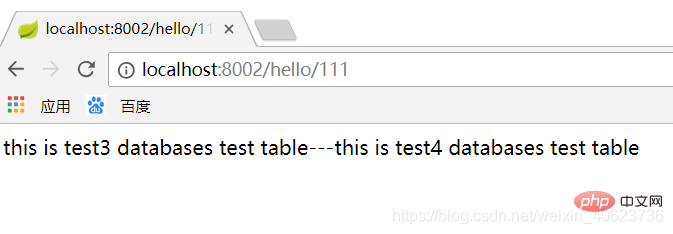
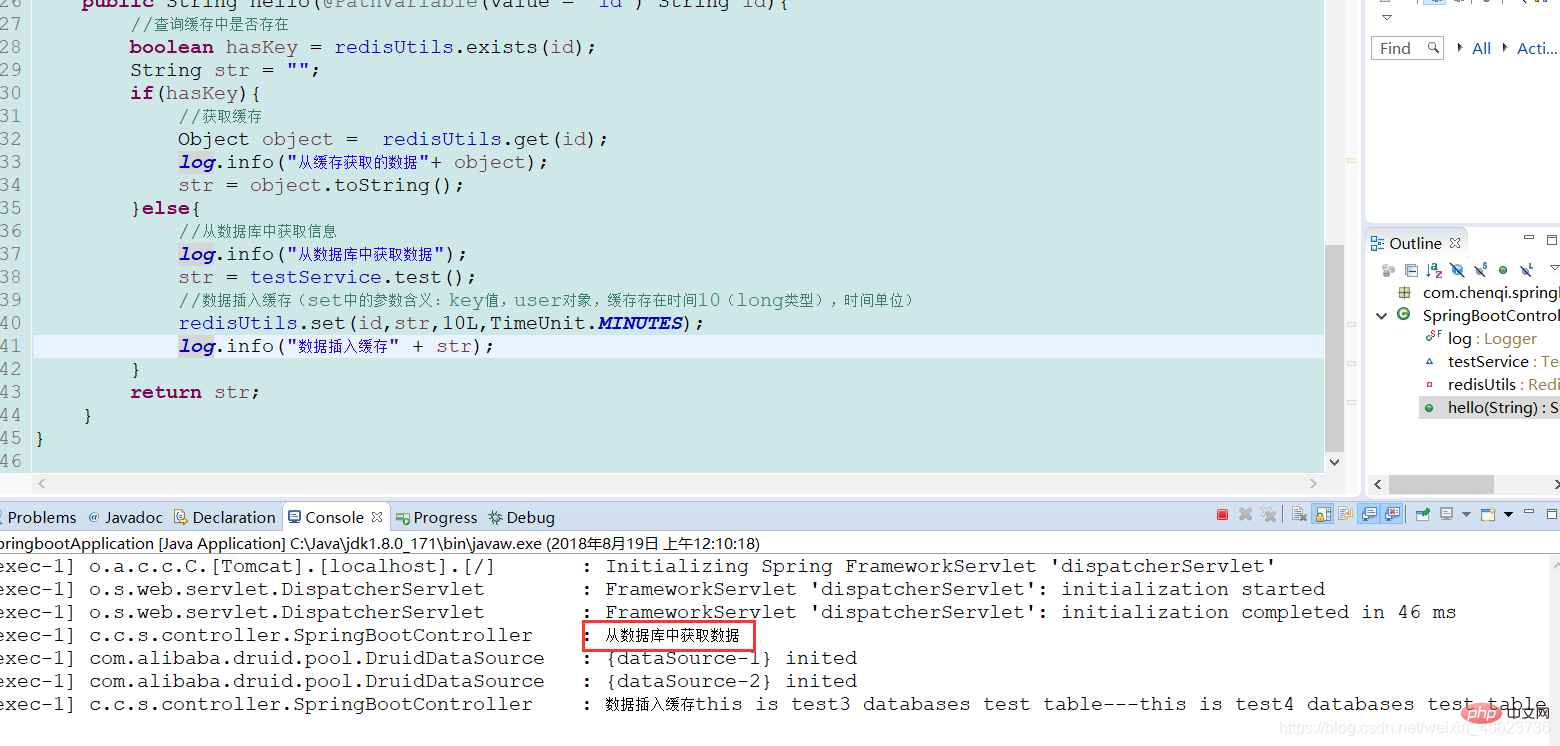
# 透過控制台輸出,我們可以看到是從資料庫中獲取的數據,並且存入了redis快取中。
我們再次刷新瀏覽器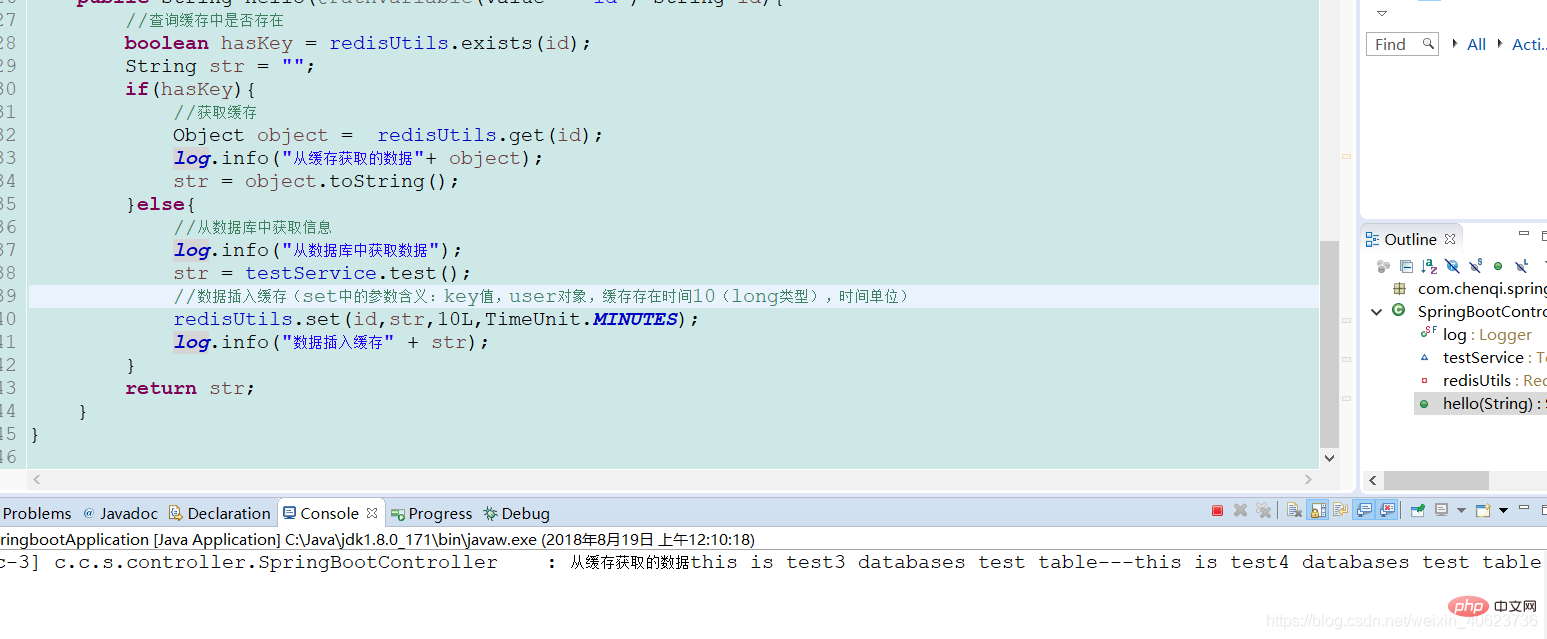
可以看到,第二次是從快取中讀取的,我們試試不斷刷新瀏覽器
可以看到,之後都是從快取中取得的。
到此我們的redis就配置好了。
SpringBoot整合Redis-demo下載
急需demo的兄弟就自行下載吧,不急可以留言郵箱,一般48小時內會發。
更多相關學習請關注redis欄位!
以上是SpringBoot如何整合redis的詳細內容。更多資訊請關注PHP中文網其他相關文章!
